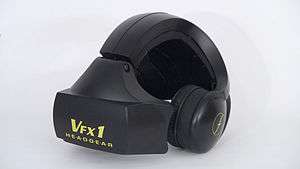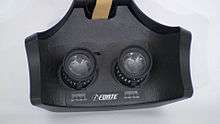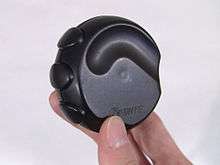VFX1 Headgear
 Forte VFX1 Headgear | |
| Developer | Forte Technologies, Inc. |
|---|---|
| Release date | 1995 |
| Introductory price | $695 |
| Display | Dual 263 x 230 color LCD displays |
| Platform | IBM-Compatible PC, ISA bus, MS-DOS |
The Forte VFX1 was a consumer-level head-mounted display marketed during the mid-1990s. It comprised a helmet, a handheld controller, and an ISA interface board, and offered head-tracking, stereoscopic 3D, and stereo audio.[1]
History
The VFX1 was developed in the early 1990s by Forte Technologies, Incorporated. It was released in 1995 with an MSRP of US$695 and an average retail price of $599, and was sold in the US in retail stores including CompUSA and Babbage's. It was superseded by Interactive Imaging Systems' VFX3D in 2000.
Features


Visual: The helmet featured dual 0.7" 263 x 230 LCD displays capable of 256 colors. Optics comprised dual lenses with adjustable focus and interpupillary distance. Field of view was 45 degrees diagonally.
Auditory: The helmet included built-in stereo speakers and a condenser microphone. Audio signals were routed to the sound card's line in/out jacks.
Tracking: Head movements were tracked with internal sensors for pitch (70 degrees), roll (70 degrees), and yaw (360 degrees). A hand-held controller called the Cyberpuck offered three buttons and internal sensors for pitch and roll. It could emulate a mouse, and connected to the helmet via an ACCESS.bus interface cable.

Interface: Audio, video, and tracking information was transmitted via the VIP Board, a 16-bit ISA card that received video input from the video card's 26-pin VESA feature connector and routed audio signals to the sound card's line in/out via external 1/8" audio jacks. Audio, video, and tracking data was exchanged with the headset via a single proprietary 8-foot cable, which could be daisy-chained for improved mobility.
System requirements
- IBM-Compatible PC with 386 CPU[2]
- VGA video card with 26-pin VESA feature connector
- 16-bit ISA expansion slot for VIP board
- MS-DOS 5.0 or later
- 500kb free hard drive space for drivers and utilities
- 20kb conventional memory for drivers
- Optional: stereo sound card